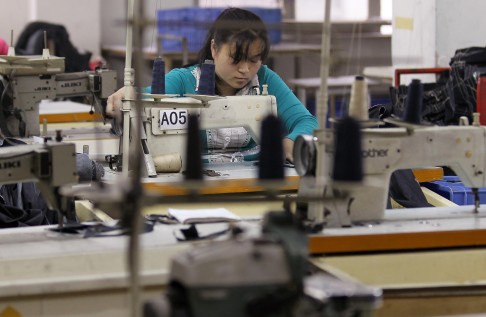
Migrant workers in Guangzhou hope to give their children a brighter future
Although children of migrant workers in Guangzhou are still barred from state schools, their prospects for education are improving
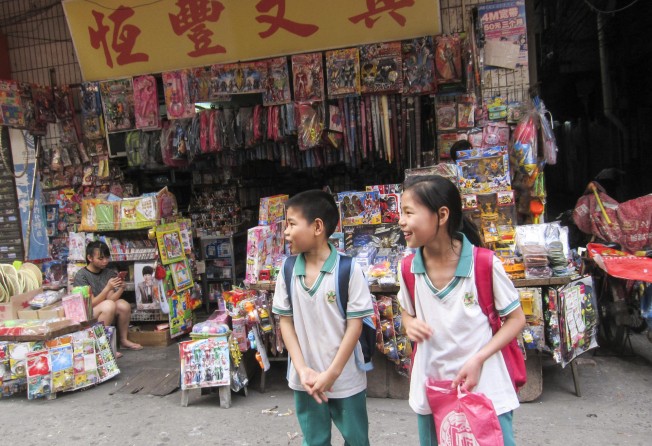
For the past couple of summers, 11-year-old Song Shiqing has been taking groups of young visitors on discovery tours of Haizhu district in Guangzhou.
Crossing a bridge over a water channel, the group arrives in an enclave called Kangle.
"Here you can buy cheap shoes and clothes," young Shiqing says, pointing to the Jia'en Department Store. "The Wenzhou noodle shop is around the corner, next to the Kangle School and vegetable market."
A junior ambassador of sorts for Kangle, Shiqing can relate to his visitors - like him, they are children of migrant workers.
Of the estimated 14 million people living in Guangzhou, nine million are officially recognised residents. The other five million are people who have come from other provinces or from rural counties in Guangdong in search of better-paying jobs.
Many migrant workers only see their families once a year when they return during the long break over the spring festival. But during the summer holidays, there is a small reverse flow as children travel from distant provinces such as Sichuan to spend time with their parents.

Song Shiqing was born in Hunan but, when he was four years old, he and his parents left to start a new life in Guangzhou, settling in Fengyang Street.
Previously a stretch of dirt road that ran past vegetable patches and mud houses on the outskirts of rural Haizhu district, Fengyang Street has grown into what is dubbed a "city village". The relentless urban spread in Guangzhou soon had vast agricultural tracts in outlying areas concreted over for the construction of factories, shops and flats.
Areas like Fengyang Street attracted a lot of migrant workers, not only because the accommodation was cheaper but also because local regulations were less strictly enforced. Now it is home to 200,000 migrant workers and their families, about four times the number of official residents.
Shiqing's parents run a garment printing shop in Kangle enclave in Fengyang. The ironically named Kangle, which means recreation, is a gritty industrial neighbourhood sustained by an array of businesses run by migrants - from food stalls, hair salons and stationery shops to garment factories in old tenement buildings.
Most migrants living in Kangle are linked to the garment industry which feeds the thriving textile markets of Haizhu. Its noisy streets are jammed with pushcarts and tricycles all day as migrants ply their trade, living on the edges of society.
Under the hukou, or household registration system, however, migrant families are excluded from the social benefits such as health care, housing and education that official residents enjoy even though they may have lived in the area for a decade or more. Barred from attending government schools, which are free for youngsters with hukou, migrant children often end up having lessons in informally organised and poorly funded classes
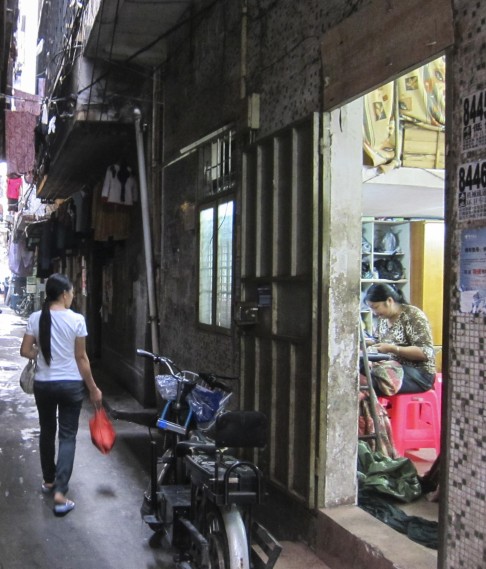
Crude rooftop schools still operate in various places, but the quality of facilities and teaching in community-funded elementary schools have improved over the years.
There are 12 such civilian schools in the Fengyang Street area, charging students tuition fees of between 6,000 yuan (HK$7,600) and 9,000 yuan annually. They may not have the kind of resources available to public schools but all follow the government syllabus.
Song Shiqing is among the beneficiaries. An exceptionally bright and motivated youngster, he has done well to earn 280 out of 300 marks in the combined score for maths, Chinese and English.
And as Guangzhou's public schools are gradually opening their doors to migrant children, Shiqing hopes to apply to enter a top middle school next year.
If admitted, his parents will have to pay a one-time sponsorship fee of 30,000 yuan for the three years in junior high.
Last year, the State Council began relaxing controls on the hukou system by lifting restrictions in small towns. But changes are slow to extend to larger cities. Municipal governments with limited tax revenues find it a challenge to extend social benefits to huge migrant populations. Some try to develop or outsource services to help migrants integrate into urban society.
Little Goose Migrant Children Community Centre is one such service in the Kangle enclave. The centre, which draws its name from the migratory birds, is a joint operation between the Haizhu municipal government, World Vision and Qi Chuang Social Work Development Association, an NGO set up by Hong Kong academic Agnes Law Koon-chui.
"We not only provide a place where migrant children aged between six and 16 can do homework while their parents are at work, we also oversee their personal development and serve families in need," says Little Goose project officer Zhou Guanjun.
"Many migrant parents barely attended school themselves but they break their backs working to pay their children's tuition."
Our purpose of moving to Guangzhou is for our children to have broader horizons
Some migrant workers put in 18-hour shifts in sweatshops, others sell vegetables, sweep the streets or labour in construction sites. Often that just brings in 5,000 yuan a month.
People who cannot afford tuition for their children send them back to their hometowns to receive free schooling, but that often leads to domestic strife. "The kids are so upset they refuse to talk to their parents for months after returning home. Not only are they separated from their mother and father, their grandparents are too old to look after them," Zhou says.
Still, prospects are looking up in Guangzhou, where government schools are gradually opening their doors to migrant children.
"Guangzhou is revamping its policies towards migrant students who may receive free education in public schools after fulfilling certain residency requirements," says Zhou. "But migrant students still have to get much higher scores than local students to gain admission."
Although migrant children must persevere against great odds to succeed, "we believe it is more productive to give a child an education opportunity rather than money, food or clothing, so that poverty can end in his generation," says Wendy Cheng Man-king, the coordinating director of Qi Chuang.
But students who secure a coveted place in a good school present their struggling families with different dilemma.
Xie Wanxin had mixed feelings when her daughter, 14-year-old Su Xuai, was admitted to Chi Gang Middle School in Haizhu two years ago.
"I was so happy but at the same time I had to pay 30,000 yuan immediately for the sponsorship fee. Still, I'm proud of her. If she was not good enough, the money could not buy her a place. She is now in an honours class," Xie says.
The family moved to Guangzhou in 2005 from rural Shaoqing. But despite being from Guangdong province, they could not obtain the urban hukou.
"Our purpose of moving to Guangzhou is for our children to have broader horizons," Xie says. "My husband and I agreed to support them all the way through university."
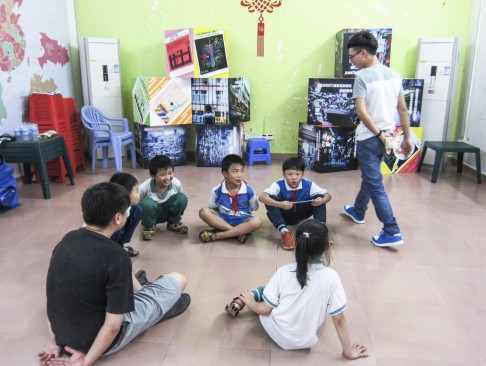
Every morning after taking the children to school, Xie went to a sweatshop where she stitched garments for eight hours. She was paid a daily rate of 100 yuan, which was mostly spent on food. After paying the 1,000 yuan rental for their 300 sq ft flat, it was hard to set aside any money for their three children's education, she says.
Their greatest hope now is to acquire a Guangzhou hukou so the children can receive free education. In the meantime, she tells her younger daughter, Xumin, 10, and son Zexin, eight, to get a solid grounding in the community school so they can gain admission to a good middle school. The pair show great promise: Xumin got 284 marks and Zexin 287 marks out of 300 for their composite score.
At Little Goose centre, Zhou says: "Overall, migrant students' general knowledge is not as good as local students who attend tutoring classes. But given the same opportunities, migrant children who are equally bright will excel in school."
Wang Jinfeng, a migrant student from Kangle, showed the way in 2012. She earned such a high score that Haizhu Experimental School, a top-ranking government institution, waived the 30,000 yuan sponsorship fee. Now 19, Wang is a first-year social work major at Guangzhou University and ranked first in her class.
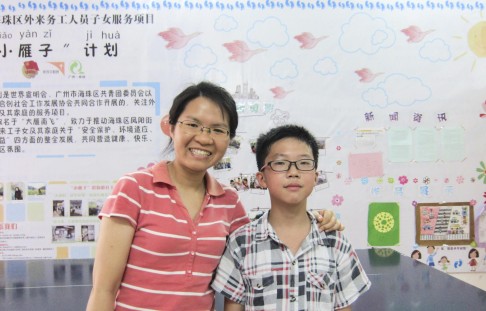
Her family, who were originally from Maoming, settled in Kangle when she was two years old. Education facilities were so poor her kindergarten class was cancelled on the first day, and it was three years before she attended her next class - in elementary school.
Her younger sisters hope to make the same leap to enter university in Guangzhou. Wang is preparing her 15-year-old sister to take the university entrance exam by giving her past exam questions.
Her mother worked as a seamstress in a garment factory to support her four children. Every day after finishing her homework, Wang and her three younger sisters would help their mother with the piecework that she brought home.
While in junior high school, Wang also worked part time in a department store to help pay for living expenses. "My mother has taught us to be independent. Life was hard, but it trained my character," she says.